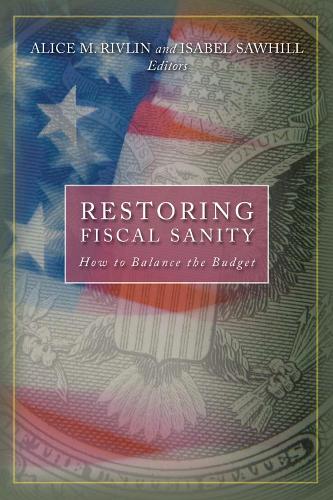
Restoring Fiscal Sanity: How to Balance the Budget
(Paperback)
Available Formats
Publishing Details
Restoring Fiscal Sanity: How to Balance the Budget
By (Author) Alice M. Rivlin
Edited by Isabel V. Sawhill
Bloomsbury Publishing PLC
Brookings Institution
29th March 2004
United States
Classifications
Professional and Scholarly
Non Fiction
Political economy
Public finance and taxation
352.4
Physical Properties
Paperback
152
Width 152mm, Height 228mm, Spine 10mm
231g
Description
"
The United States is standing at a critical juncture in its fiscal outlook. After experiencing a brief period of budget surpluses at the turn of the century, the federal government will run deficits that add about $4 trillion to the national debt over the next decade. Substantial deficits will likely continue long into the future because the looming retirement of the baby boom generation will raise spending in Social Security, Medicare, and Medicaid. At the same time, the federal government appears to be neglecting spending in key areas of social and economic policy. The nation thus faces a vital choice: continue down a path toward future fiscal crisis while under investing in critical areas, or increase resources in high-priority areas while also reducing the overall budget deficit. This choice will materially affect Americans' economic status and security in the immediate future as well as over long horizons. In R estoring Fiscal Sanity, a group of Brookings scholars with high-level government experience provide an overview of the country's likely medium- and long-term spending needs and the resources available to pay for them. They propose three alternative fiscal paths that are more responsible than the current path. One plan emphasizes spending cuts, the second emphasizes revenue increases, and a third is a balanced mix between the two.
The contributors address the policy choices in such areas as defense, homeland security, international assistance, and programs targeted to the less advantaged, the elderly, and other domestic priorities. In the process, they provide an understanding of the short- and long-run trade offs and illustrate how the budget can be reshaped to achieve high priority objectives in a fiscally responsible way.
"Reviews
"This book is quite comprehensive, lucid, and insightful. It is highly recommended as a reference for both scholars and policy makers. It provides a reasonable range of policy options to the complex issue of the U.S. budget deficit, and hence makes an excellent contribution to the literature in this area." Meili Niu, Sun Yat-sen University, China, Public Budgeting & Finance
Author Bio
Alice M. Rivlin is a senior fellow in Economic Studies at the Brookings Institution and visiting professor at the Georgetown Public Policy Institute. She has been director of both the White House Office of Management and Budget and the Congressional Budget Office, and has served as vice chair of the Federal Reserve Board. Among her previous books is Beyond the Dot.coms: The Economic Promise of the Internet (Brookings, 2001), written with Robert Litan.Isabel Sawhill is vice president and director of the Economic Studies program at the Brookings Institution. She served as associate director of the Office of Management and Budget.
